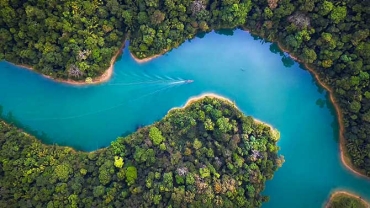
Thijs IJsbrandij and Yasmin Barwanitz (PwC) on the impact of the COP15 agreement
A groundbreaking agreement, is how the UN COP15 summit outcome has been called. The Kunming-Montreal Accord is to biodiversity what the 2015 Paris Agreement is to climate: clear targets without concrete details. But to companies, it is only a matter of time before these goals are translated into new regulations and stricter nature protection requirements.
We asked our network of experts about the expectations and opportunities of this summit and during COP15 talked to Louise Vet (Stichting Deltaplan Biodiversiteitsherstel), Koos Biesmeijer (Naturalis) and Hans de Kroon (Radboud University), among others. Now that the summit has concluded, we want to look ahead. What are the implications of the agreement reached on business? A concluding article in a series with biodiversity experts at PwC: Thijs IJsbrandij and Yasmin Barwanitz.

Thijs IJsbrandij: Expert Environmental Strategy (PwC)
The agreement has been described in the media as ‘groundbreaking’, ‘historic’ and ‘ambitious’. How groundbreaking do you think the COP15 agreement is?
IJsbrandij: 'It's easy to focus on what's not in the agreement, but the fact that 196 countries agreed on four new long-term goals for 2050 and 23 goals for 2030 makes me feel very positive. If we put the actions in place now to meet the targets that have been set, we will really take a major step in terms of conservation and restoration of nature. But that requires a lot from governments and businesses. The international community has set the bar high.
'The agreement explicitly mentions that companies have a role to play in the transition ahead.'
What are the main objectives of the Kunming-Montreal agreement?
Barwanitz: 'The agreement systematically addresses all the drivers that cause biodiversity loss and sets targets to substantially reduce these pressures as early as 2030.'
'It has been agreed, for example, that by 2030 at least 30 percent of the total earth's surface, both land and sea, must be protected areas. In addition, for example, the use of pesticides and harmful chemicals must be halved. Furthermore, subsidies that are harmful to nature and ecosystems must be reduced by five hundred billion dollars a year and for the first time, to my knowledge, there is explicit attention for respecting the rights of indigenous people and local communities. Of course, all this also requires a financial contribution from rich countries. Agreements have also been made about that.'
This sounds progressive, but the agreements are non-binding. Much elaboration and translation into laws at the national level is still needed before the implications of the goals become concrete. What is your expectation?
Barwanitz: 'These goals have been negotiated by governments internationally, and it is governments who then have to translate them into national policies. Let's not forget that this is simply the way these kinds of conferences work. Even the Paris climate agreement only became concrete when it was translated into European and national policies, for example.'
'Around other environmental topics that are the subject of this new agreement, you are now seeing a similar process. There are already advanced plans and legislation at the European and even national level. Think of the EU Biodiversity Strategy, Water Framework Directive, Birds and Habitats Directive and the Dutch Nitrogen Law. This agreement will provide an impetus for further elaborating and raising the ambitions of these types of plans and regulations.'
IJsbrandij: 'Governments have a clear role to play in the field of biodiversity and conferences like COP15 make that role even more emphatic. We are increasingly going to see that governments will address the impact of nature damage by companies, develop policies and regulations and force companies to transform. This is a very interesting phase for business, because this is the time to anticipate policies that you can be very sure these will be introduced in a few years time.'
Approximately half of global GDP depends on nature, but businesses typically don't have a good understanding of nature risks and do little to reduce their own damage to nature. What does COP15 mean to businesses?
IJsbrandij: "This agreement represents an important step in protecting the interest all of us have, including all businesses, in conserving and restoring nature. The agreement also explicitly mentions that businesses have a role in the transition ahead.
'Target fifteen states that governments should take measures to ensure that large companies and financial institutions regularly monitor, assess and transparently publish their risks regarding dependence on and impact on biodiversity. This target will be very recognizable to companies within the European Union, as it dovetails perfectly with the CSRD that comes into effect from 2024.'
'Partly given this development, it is important for companies to take action within a short period of time. Many of the frameworks developed within the climate topic can also be used in the area of biodiversity. That is a head start and I expect that it will allow us to move faster. The business community is going to notice that because the bar will be raised much faster.'
What should companies do now?
Barwanitz: 'The goals of the COP15 agreement cover a wide range of potentially harmful environmental impacts. So as a company, it is important to map, analyze and translate these impacts throughout the value chain into a concrete strategy with clear targets and actions. To actually shape and prioritize such a strategy, three elements are central as far as I am concerned:
- To what extent are environmental impacts consistent with the carrying capacity of the areas in which you operate? This is an important aspect of the drivers of biodiversity loss. This is because the same impact can have different effects in two different locations.
- What can you do to avoid, reduce or compensate for these impacts? What actions/investments are needed to implement these measures?
- To what extent are you at risk, should the government tighten the rules - which you have so far complied with nicely -? And, should the government not do so, what is the risk of lawsuits from the environmental movement?'
'So, all in all, there is a great opportunity to address these kinds of issues in conjunction and thus take an organization's entire environmental agenda to the next level.'
The stated objectives can lead to concrete challenges. Could you give an example?
IJsbrandij: "The battle for space can become a specific challenge to companies. So in the agreement it was agreed that by 2030 at least 30 percent of land and water should be protected areas. That's considerably more than today. Many industrialized countries can expect major restrictions in the near future. Indeed, in addition to this objective, there are other claims on land and intensive use of land will become more difficult due to pollution reduction targets.'
'According to objective ten, possible solutions are sustainable intensification, agroecological and other innovative approaches. But how does that work in practice on a large scale and will those kinds of initiatives yield enough? Can we bridge the gap and preserve corporate profits while applying "nature-based solutions"? Can we produce similar quantities with fewer chemical pesticides and with less space? These are all major questions that need to be answered in the near future.
'Companies need to identify risks. For example, what is the risk of lawsuits from the environmental movement?'
That sounds challenging, to say the least. There's plenty of work ahead, that's clear. Any final advice?
Barwanitz: "These are fundamental developments. Companies often have a large environmental impact and, through this COP and resulting policymaking, face new regulations that can raise major transformational issues. Old business models will not simply survive. So keep an open mind and be timely in making adjustments. The clock is ticking and we have no time to lose.'

Yasmin Barwanitz: Expert Sustainability & Responsible Governance (PwC)





















